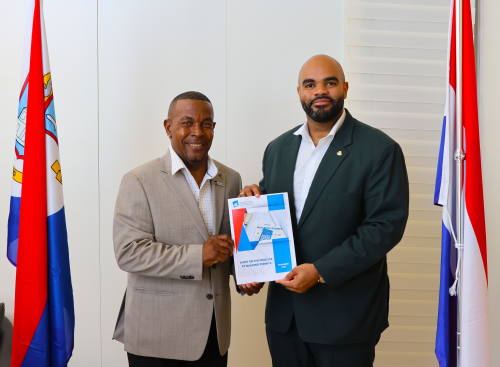~Gumbs outlines ongoing and future Improvement Measures~
 PHILIPSBURG:--- The General Audit Chamber officially handed over its audit report on the building permit issuance and denial process to the Minister of Public Housing, Spatial Planning, Environment, and Infrastructure (VROMI) Patrice Gumbs during a productive meeting focused on transparency, efficiency, and reform.
PHILIPSBURG:--- The General Audit Chamber officially handed over its audit report on the building permit issuance and denial process to the Minister of Public Housing, Spatial Planning, Environment, and Infrastructure (VROMI) Patrice Gumbs during a productive meeting focused on transparency, efficiency, and reform.
The audit examined the legal framework, procedural integrity, and data usage in St. Maarten's building permit process (2020-2024), a critical system for managing development on an island with limited land resources, fragile ecosystems, and infrastructure constraints. The report is intended as a roadmap to reduce fraud risks and improve efficiency in permitting processes.
The audit revealed that St. Maarten's permitting framework is fragmented and outdated. The Building and Housing Ordinance of 1935 remains the primary legal basis for construction, supplemented by ordinances and non-binding policies that lack formal legal status. The long-awaited island-wide zoning plan remains incomplete, forcing staff to interpret outdated policies on a case-by-case basis, which increases risks of inconsistent enforcement and legal uncertainty.
The permit process operates largely through manual, paper-based workflows. While applications are logged in the system, neither applicants nor management can track progress effectively. Critical safety advice from entities like the Fire Department is sometimes disregarded without written justification, and ministerial decisions can deviate from expert recommendations without documented reasoning.
Significant capacity constraints were identified. The Permits Department operates with limited staff, many lacking technical qualifications specified in official function descriptions, and no structured training program exists. At the time of the audit, only one Fire Department officer handled all permit-related reviews.
During the handover meeting, the Ministry welcomed the five key recommendations and outlined concrete steps to address the recommendations:
Standard Operating Procedures (SOPs): The Ministry echoed the urgent need for SOPs to curb discretionary and inconsistent permit decisions. The Civil Works manual has been finalized, and will soon be published, clarifying circumstances under which certain permits are required. The creation of a general workflow document will also commence, to ensure uniform evaluation, through clear procedures, which will also help to mitigate the potential for a backlog.
Digitalization: Recognizing that paper-based processes increase inefficiency and risk, the Ministry is preparing a Terms of Reference for automating and digitizing permitting processes. The request for managing this procurement, on behalf of the Ministry, is set for review at the end of next week. The digitalization effort will focus on improved customer communication, status tracking, and transparency.
Capacity Building: The Netherlands, through the Ministry of BZK, provided VROMI €1.4 million to build capacity for the trust-fund related projects. Subsequent discussions have given way for the subsidy to also be used for building the necessary secondary capacity within the Ministry. The Ministry will be hiring between 6 and 9 people for a period of one year. VROMI is collaborating with the Ministry of VSA’s National Employment Services Center (NESC) and will use their database to fill the vacancies, where possible. The vacancies are live as of today and can be found on the Government’s social media. Interested people are encouraged to apply; the deadline is set for Friday, December 5, 2025. More structurally, the Ministry is in discussion on revising the existing function book, which regulates the positions, salaries, and tasks of civil servants.
Accountability and Documentation: The Audit Chamber voiced its concerns regarding Ministerial deviation, that is, the ability of Ministers to accept or deny building permits without proper substantiation. The Minister outlined his efforts to ensure transparent decision-making with the introduction of memos that document concerns and deviations, if applicable. The Audit Chamber welcomed this initiative but noted that political change could mean the return to unsubstantiated deviations as observed in the past, underscoring the need to make mandatory, through law, the substantiation of a Ministerial deviation.
Policy Updates: The Ministry outlined progress on several policies, including the land policy, the spatial economic strategy, the land price policy, and the domain affairs backlog, which have all been recently approved by the Tijdelijke Werkorganisatie (TWO). In addition, the Ministry is awaiting the approval of its proposal to TWO for the completion of the zoning process for Sint Maarten. The Minister viewed the lack of uniformity in zoning as an obstacle to development.
“The lack of zoning creates an unclear and subsequently unfair playing field for persons who wish to develop a parcel of land. Approval currently relies on ministerial discretion to accept or deny the proposed advice. The realization of this zoning, coupled with our timeline to have a corrected National Decree on Administrative Enforcement by Q2 2026, will support our policies on beach and hillside use and strengthen our ability to implement and enforce our own laws”, stated Gumbs.
The General Audit Chamber thanked the Ministry for its exceptional cooperation, recognizing the openness of the staff throughout the audit process. The Minister invited the Audit Chamber to consider a follow-up report to assess the impact of the ongoing and proposed initiatives. Both parties commended the spirit of cooperation and emphasized the shared goal of depoliticizing and professionalizing the Ministry's operations through transparency and sustainable procedure reforms.
The complete report is available on the General Audit Chamber's website.